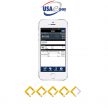
Flat Rate vs. Interchange Plus Credit Card Processing
There are two common ways businesses pay for credit card processing.
Flat Rate and Interchange Plus (aka Cost Plus).
Let’s first talk about the flat rate model.
The most common flat rate among providers is 2.9% and there’s usually a 30 cents per transaction fee.
The well known flat rate providers can approve a merchant and allow them to start accepting payments in a matter of minutes.
The quick and easy onboarding is great for startups who are processing under 20K a month in credit cards transactions.
Once your business starts ramping up to 50K, 100K and 500K+ per month, 2.9% is a pretty penny to pay for just accepting credit card payments. (and don’t forget about that 30 cents per transaction)
Here’s a quick breakdown of how it works – we’ll keep the math simple.
Let’s say you hit 1,000 transactions next month.
And they make up 100K in revenue.
Your provider charges the standard 2.9% + 30 cents per transaction.
2.9% x $100,000 = $2,900
$0.30 x 1,000 transactions = $300
Your total in processing fees for that month is $3,200
And what if the volume stays consistent each month?
You’re paying $38,400 per year for credit card acceptance.

There comes a point when a business may consider graduating from the flat rate model.
Let’s break down the Interchange Plus model
Interchange: The unavoidable rate that credit card brands and issuing banks charge for every transaction (Visa/MasterCard, Discover, etc.)
When someone swipes (or inserts) a Visa card, Visa charges an interchange fee.
It’s how they make their bread and butter.
Flat rate pricing bakes the interchange fees into that 2.9%.
But interchange varies among different card types and brands.
Interchange for a debit card is commonly regulated at 0.05% and 22 cents while a credit card’s interchange average is 2.00% and 10 cents.
Plus: the small percentage that a processor charges on top of interchange. This rate is usually less than 0.50% + 20 cents per transaction depending on your provider.
Use the same scenario from our flat rate pricing example:
You hit 1,000 transactions and process 100K per month. Let’s say you process 40% debit cards and 60% credit cards.
For this example, interchange rates averaged out to 2.05% this month.
Your “cost plus” processor has you at 0.20% and 10 cents over interchange.
Interchange cost (percentage): 2.05% of 100K = $2050.00
Interchange cost (per transaction): $148.00
Processor markup: 0.20% + 10 cents/transaction = $300.00
Total Cost: $2498.00
Your total processing fees for the month are $2,498.00
Saving your business $702.00 per month and $8,424 per year compared to a flat rate.
It’s a noticeable difference.
Now, some businesses may feel they’ve been burned by interchange plus in the past.
There are providers out there who take advantage of this model and overcharge merchants.
As long as you’re not considered a high-risk business, then you shouldn’t be charged any more than 0.50% on top of interchange. If this is the case, then you may consider switching to a new provider.
A rate review is a great way to find out if you’re being overcharged for payment processing. You can request a free rate review here.
So why would someone even consider flat-rate pricing if it’s more expensive?
Flat rate solutions are easy.
A small business can be approved and start accepting payments in a few minutes.
Because interchange plus is a customized model and tailored to each business, the application process takes a little longer. It gives your processor the time to understand your business and provide a long-lasting solution. Onboarding can take 24 – 48 hours.
Not to mention, the breakdown and lingo of interchange can be confusing and people like a simple number to keep things easy – even though they could save themselves thousands of dollars in processing fees.
Conclusion
Both pricing models can be a good fit depending on the type and stage of business.
The flat rate model is great for startups and side hustles.
It’s easy to get started and you can accept payments in under 5 minutes.
When a business enters the big leagues, Interchange Plus credit card processing is crucial. It can potentially save thousands in fees.
And, if you have any kind of issues or questions about your payment solution, responsive and knowledgeable support is going to be your best friend.
Interested in exploring interchange plus for your own business?
Preferred Payments offers interchange plus pricing and integrates with thousands of online shopping carts, POS systems and mobile apps.
Plus, every merchant gets a lifetime dedicated account manager to help with ongoing technical support, onboarding and general questions. Book a free consultation with your dedicated account manager to learn more.
Ready to get started?
Get in touch or create an account





